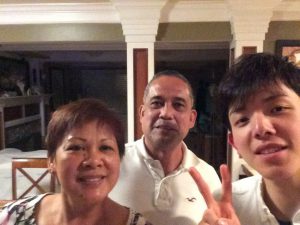
Homestay is one of the most popular living options in Los Angeles. Many students choose a homestay or dormitory on their first trip to LA.
Homestays and Dormitories both have their own advantages and disadvantages, however, one key advantage of homestays is that they are perfect for students who want to be in an English-speaking environment or want to experience American culture.
There are occasional stories of people having issues or bad experiences with their host families. When people from different cultures meet, there is a possibility for some friction. This is not exclusive to homestays and can occur in both Dormitories and Roomshares.
I want to know in advance about possible troubles in my homestay, and what to do if it happens? The content is perfect for those who are looking for the answer.
If you read this, you will learn how to avoid most potential issues and you will know how to get along well with your host family.
What you need to know in your homestay

First, it is important to remember that students (guests) are not customers, and hosts are not maids.
Homestays are not hotels. Some may mistakenly expect the host to entertain guests and to do anything they are asked of.
If you have this type of preconceived notion, you may end up regretting it and feel buyer’s remorse, or that this wasn’t what you signed up for.
The best parts of doing a homestay are living with the host family as a member of their family, improving your English as you engage in cultural exchange. As a member of the family, you will be expected to be respectful, independent and help one another.
Living with a host family requires efforts and is about giving and taking. It is important to be grateful for the opportunity to practice the English you are learning that your host family provides.
Reasons for homestay problems

Now you know about being a successful homestay. However, you need to know other things. Next, let's see what causes the trouble with the host.
Misunderstanding due to communication issues
At the beginning of a student’s study abroad stay, the language barrier may be quite burdensome.
At first, you might struggle to understand what your host says to you. Many students are too shy to ask for clarification, or are embarrassed to ask their host to repeat themselves, so they simply pretend to understand what their host said. it is crucial that you communicate openly with your host if there is anything that is unclear, and also that you do not be afraid that your host will be annoyed or irritated.
You can prevent many potential issues or misunderstandings from happening by being honest and clear with your host. Make sure to talk to them and do not feel intimidated. They wouldn’t take students in if they weren’t prepared to answer questions and be patient, after all.
Excessive expectations from host families
Most people have an expectation of families in America to consist of a father, mother, children and several pets all living together in a large house. Students also envision the family all getting together and showing them around on weekends.
There are families in America that fit this description, but not all hosts are like this. Some of our hosts are single people, single parents or live in apartments. Also, many of our hosts are working and may not have the time to show you around every weekend.
Los Angeles is a very diverse place with several different races of people living in it. We sometimes get requests for people to live with an “American” family, but that is not specific. What matters the most isn’t the race of your home family, but rather whether the host is suitable for your own personal needs and desires.
Ignorance about house rules
Each host family has its own set of house rules, though some rules are commonplace among most homestays. You may be surprised at how unfamiliar these rules are to Japanese people, but it’s important to be familiar with them before you begin your stay.
・ Showering once a day. 5 to 10 minutes max
・ Cooking: you may have permission to use the microwave but not the stove.
・ You may have a fixed dinner time and curfew.
It rarely rains in Los Angeles. This is part of the reason why the area has such good weather, but it also results in water shortages. Thus, it’s important to save water.
Students also should try to save water. If washing your laundry weekly is too infrequent, you will need to use a coin laundromat.
In terms of cooking, many home families do not want to be liable if their guest hurts themselves or starts a fire, so that is why most students are not allowed to cook their own meals.
Homestay troubles and remedies

Here are some past cases and how we helped students deal with them.
Uncommunicative hosts
Problem: The host isn’t very talkative
Solution: The best time to communicate with your host is at dinner. The host will usually open up with a conversation starter, such as "What did you learn at school today?” or "How was your day?" However, students shouldn’t wait for their host to talk to them, rather, they should attempt to initiate a conversation on their own. Students also shouldn’t worry much about grammar and accuracy at this stage, but rather just speaking the language.
It is crucial for students to be talkative, lest hosts get under the impression that the student doesn’t want to talk.
The most common thing we hear from hosts is that students do not say anything when they see each other at home, and that students do not say good morning or good night. In America, it’s common to engage in small talk and these types of polite greetings. It is important for students to become familiar with them so that their hosts can become comfortable with them.
The host said bad things about me.
Problem: My host made a sarcastic or rude remark about me.
Solution: When we often talk with the host about a perceived insult, more often than not the host did not actually say what the student thought they heard.
Rather, it’s another case of miscommunication.
Japanese people tend to be thought of as cold if they speak in a brash or frank manner. Some people also have a blunt way of speaking that comes off as rude, even if they don’t mean to be hurtful. The same applies to Americans as well: someone might be strong in their words, but not actually be insulting or rude.
Furthermore, American jokes are often sarcastic, which might be unfamiliar to Japanese people. Nevertheless, if you maintain good communication with your host you should be able to avoid any potential mishaps regarding humor.
This is you never do that even though you don’t understand what the host is saying, you understand differently. It will almost always cause trouble.
If you hear something truly offensive, it’s a good idea to have a discussion with your host about it, such as by asking "Why did you say that?" It might be a difficult conversation to have, but it’s better to get it out into the open than stay uncomfortable.
Are you eating enough?
Problem: The food provided isn’t very varied or is bland
Solution: Become well-acquainted with the American diet
In your country, there may be many dishes during meals, including staple foods, main dishes, side dishes, soups, etc. In the US, dinner usually consists of a protein along with two or three vegetables or starches. Occasionally, some families stereotypically buy fast food, such as burritos, Chinese, burgers or pizza.
It may seem monotonous compared to your diet, but this is typical in America. Also, hosts who cook different meals every day are rare. In fact, it’s common to have leftovers from previous dinners as well.
If there are major issues with the food, such as their diet being too much compared to your relatively simple one, it may be best to consult with an agent.
I can’t study English since there are several international students from my home country.
Problem: I keep running into students from my home country.
Solution: It is very difficult to avoid other Japanese people in a city as big as Los Angeles. There are many Japanese people in every foreign language school and in most homestays and dormitories.
Don't be discouraged by the presence of people who speak the same language as you! Instead, you should try to speak English with them.
Hosts may be offended or uncomfortable if you and your friends speak in your native language.
If you really want to avoid homestays with people from the same country, make a request for a host that only accepts one student. There are several hosts like this, so it’s always a good idea to check their availability.
Shower issues
Problem: The hosts think I take too long to shower
Solution: Most hosts ask you to limit your showers to 5 or 10 minutes.
Hosts don’t want your total time spent showering to be that short, but rather just the time you spend using hot water. You can save on using water by turning off the water at times, and adjusting your bathing habits accordingly.
Someone is using my personal belongings
Problem: My cleaning utilities are used up quicker than I expected
Solution: In America, the bathroom is shared with other students and family members. Avoid putting your personal belongings in a shared space to avoid trouble. Put shampoo, face wash, etc. in your basket and keep it on your person rather than leaving it in the bathroom.
Put your passport and valuables in your suitcase and lock them. Please manage your valuables and personal belongings at your own risk.
What you need to do to avoid troubles in your homestay

We told you that most homestay issues arise from a lack of communication.
American culture doesn’t follow Japan’s culture of being indirect and expecting people to read the atmosphere. Americans speak their mind and are open and confrontational if there is an issue. Japanese people may have some issues with directly saying Yes or No, but becoming familiar with direct communication is incredibly important.
Summary

Most troubles can be avoided if you know the habits and rules you need to know in advance.If you can't solve it by yourself, talk to the agent. Let's express our intentions, communicate and lead a comfortable and fulfilling homestay life



